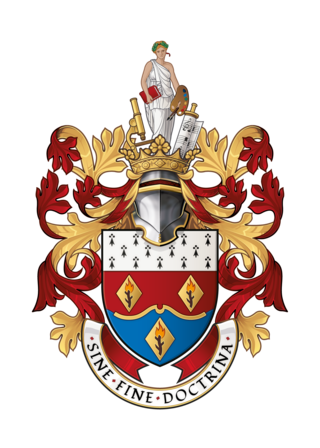Related Research Articles

Timewatch is a long-running British television series showing documentaries on historical subjects, spanning all human history. It was first broadcast on 29 September 1982 and is produced by the BBC.
The MacArthur Fellows Program, also known as the MacArthur Fellowship and colloquially called the "Genius Grant", is a prize awarded annually by the John D. and Catherine T. MacArthur Foundation to typically between 20 and 30 individuals working in any field who have shown "extraordinary originality and dedication in their creative pursuits and a marked capacity for self-direction" and are citizens or residents of the United States.

Fantastic Voyage is an American animated science fiction TV series based on the famous 1966 film directed by Richard Fleischer. The series consists of 17 half-hour episodes, airing Saturday mornings on ABC-TV from September 14, 1968, through January 4, 1969, then rebroadcast the following fall season. The series was produced by Filmation Associates in association with 20th Century Fox Television. A Fantastic Voyage comic book, based on the series, was published by Gold Key and lasted two issues.

The Birmingham and Midland Institute, is an institution concerned with the promotion of education and learning in Birmingham, England. It is now based on Margaret Street in Birmingham city centre. It was founded in 1854 as a pioneer of adult scientific and technical education ; and today continues to offer arts and science lectures, exhibitions and concerts. It is a registered charity. There is limited free access to the public, with further facilities available on a subscription basis.

The following index is provided as an overview of and topical guide to underwater divers:

This is a list of underwater divers whose exploits have made them notable. Underwater divers are people who take part in underwater diving activities – Underwater diving is practiced as part of an occupation, or for recreation, where the practitioner submerges below the surface of the water or other liquid for a period which may range between seconds to order of a day at a time, either exposed to the ambient pressure or isolated by a pressure resistant suit, to interact with the underwater environment for pleasure, competitive sport, or as a means to reach a work site for profit or in the pursuit of knowledge, and may use no equipment at all, or a wide range of equipment which may include breathing apparatus, environmental protective clothing, aids to vision, communication, propulsion, maneuverability, buoyancy and safety equipment, and tools for the task at hand.
References
- Stephen Jones & Jo Fletcher. "The British Report". Science Fiction Chronicle. Volume 18, Number 2. Issue 191. April–May 1997. ISSN 0195-5365. pp 56 & 58.
- ↑ For reviews of this episode, see Peter Waymark, "Future Fantastic: Alien" in "Choice", The Times, 21 June 1996, p 51; Lynne Truss, "Murder most torrid in dull old Dixieland", The Times, 24 June 1996, p 47; Nancy Banks-Smith, "Why aliens are alienated", The Guardian, 22 June 1996, p 18; and Jasper Rees, "Television: Future Fantastic", The Independent, 21 June 1996.
- ↑ For a review of this episode, see Peter Waymark, "Future Fantastic" in "Choice", The Times, 28 June 1996, p 47
- ↑ For a review of this episode, see Peter Waymark, "Future Fantastic: Starman" in "Choice", The Times, 5 July 1996, p 47
- ↑ For a review of this episode, see Peter Waymark, "Future Fantastic: The Incredible Shrinking Planet" in "Choice", The Times, 12 July 1996, p 43
- ↑ The Times, 19 July 1996, p 43
- ↑ The Times, 9 August 1996, p 39
- ↑ The Times, 16 August 1996, p 39
- ↑ For a review of this episode, see Elizabeth Cowley, "Future Fantastic: Under a Purple Sky" in "Choice", The Times, 23 August 1996, p 47
- ↑ For a review of this episode, see Peter Waymark, "Future Fantastic: Immortals" in "Choice", The Times, 30 August 1996, p 47
- ↑ "About HAL and Gillian's Collaboration" . Retrieved 1 September 2008.
- ↑ "Hal press conference". Virgin. 13 May 1997. Archived from the original on 27 October 2002. Retrieved 1 September 2008.
- ↑ Jason Ankeny and John Bush. "Hal Featuring Gillian Anderson". Vladimir Bogdanov, Chris Woodstra, Stephen Thomas Erlewine and John Bush (eds). All Music Guide to Electronica: The Definitive Guide to Electronic Music. All Media Guide (AMG). Backbeat Books. 2001. ISBN 0879306289. pp 230 & 231.
- ↑ John P McCarthy, "Future Fantastic", Variety, 27 February 1997